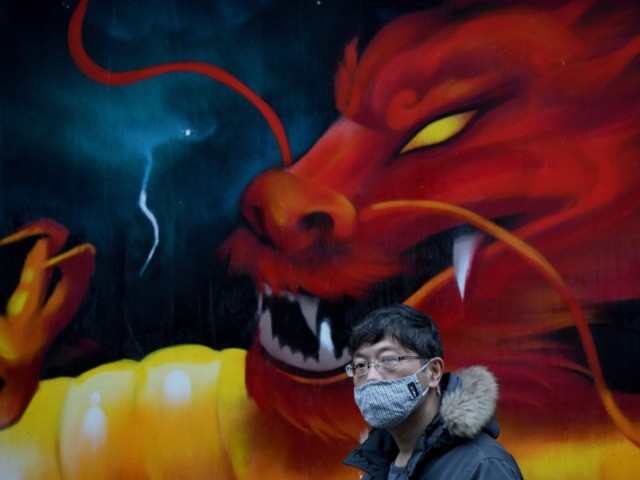China logged the deadliest day on record on Wednesday since the novel coronavirus outbreak afflicting the nation began in December, breaking a record set only on Tuesday and defying clamor from state propaganda outlets last week that the rates of infection and death were declining.
At press time, Chinese and global health officials have confirmed 28,396 cases of the coronavirus, identified only on January 20, and 566 patients dying from the disease. Only three of these have died outside of China. Officials also claimed that 1,341 people have recovered from coronavirus infection, suggesting that a significant number of those infected do overcome the illness.
The South China Morning Post noted on Thursday that Chinese officials documented 73 deaths between Wednesday and Thursday, the highest recorded in one day. That number was 64 deaths on Tuesday, the previous record.
The number of documented cases on Wednesday fell compared to Tuesday, however.
“The last time the rise in new infection figures slowed was January 28, after the daily increase in confirmed cases again rose on Tuesday – 3,887 in China, of which 3,156 were in Hubei,” the Post noted.
Among the new patients are newborn infants whose mothers are carriers of the virus, suggesting that the virus may infect in utero. Doctors have emphasized the potential that the children contracted the virus after being born, as the first patient tested positive for the virus 30 hours after being born, so no confirmation exists yet that the new infection route in the mother’s womb exists.
The current official mortality rate of the virus is hovering around two percent and includes a significant percentage of older patients and at-risk patients with prior illnesses. This number may be significantly inflated by the fact that Chinese officials did not tell health workers in Wuhan, the city where the virus originated, that the virus was contagious through the breath of a carrier, so hospitals did not isolate potential carriers, spreading the disease to people already hospitalized. The Chinese government also held a banquet for 130,000 people the weekend before it announced it had identified the virus, targeting older “empty nest” residents of Wuhan.
“Be cautious and say no to family banquet amid coronavirus outbreak: a family reunion among 9 people in Nanjing, East China’s Jiangsu, contaminated 8 while 1 initially became a virus spreader,” the Chinese state propaganda outlet Global Times warned on Thursday, over two weeks after the state-sponsored banquet.
The Global Times also reported on Thursday that “a type of herbal soup” has allegedly cured 90 percent of coronavirus patients who drank it and that the Chinese government is issuing awards to doctors who initially responded to the outbreak.
While the government hands out rewards, locals in Wuhan report “severe” hospital bed shortages despite the alleged construction of an entirely new hospital in Wuhan in little over a week.
“Despite authorities building a hospital from scratch and converting public buildings to accommodate thousands of extra patients, there was still a ‘severe’ lack of beds, said Hu Lishan, an official in Wuhan,” the Hong Kong Free Press (HKFP) reported. “There was also a shortage of ‘equipment and materials,’ he told reporters, adding that officials were looking to convert other hotels and schools in the city into treatment centres.”
Hong Kong has documented 22 cases of the virus so far, a number that increased by one on Wednesday. The outbreak has triggered a city-wide health workers strike, attracting thousands of doctors, nurses, medical assistants, and others, who are demanding that the Hong Kong government shut its border entirely with China. The health workers are also demanding more support in the form of medical equipment like face masks and other sanitary items, complaining that the open border allows Chinese who do not trust the crumbling healthcare infrastructure of their country to flood Hong Kong’s hospitals, putting strain on the local healthcare system. The health workers have been on strike since Monday.
The Hong Kong government has refused to shut the border. Instead, the government announced on Wednesday that it would require anyone entering Hong Kong through China to undergo a mandatory 14-day quarantine to prevent them from potentially spreading the virus. Doctors believe that patients carrying the virus will show symptoms within this two-week period.
The accelerating death rate calls into question the Chinese National Health Commission’s insistence that the rate of infection in the country was declining last week, suggesting that the viral outbreak had peaked. Last Wednesday, the Global Times noted that, between that Tuesday and Wednesday, the number of cases documented had slightly declined, calling it a “gleam of hope.” At the time of publication of the article, widespread reports from individuals in Wuhan and health workers there suggested that the Chinese government was deliberately failing to test individuals exhibiting the tell-tale fever, coughing, and difficulty breathing associated with the new coronavirus. Anonymous medical staff in Wuhan told various outlets that their supply of testing kits to confirm illnesses was limited and the government only allowed testing on pre-approved patients, resulting in many who went to hospitals asking to be tested being turned down.
Chinese officials have also been extremely secretive about the cases of coronavirus documented in Xinjiang, China’s westernmost province located hundreds of miles from Wuhan. Xinjiang is home to a complex system of hundreds of concentration camps designed to indoctrinate, sterilize, enslave, and use for organ harvesting millions of Muslims, most belonging to the regions Uyghur ethnic minority. Survivors of the camps report people dying regularly and extremely unhygienic conditions in the camps that make prisoners particularly vulnerable to an outbreak of a deadly virus. Officials there are considering the condition and number of cases of coronavirus in the region a “state secret,” leading many to question the authenticity of the number of cases there.
Follow Frances Martel on Facebook and Twitter.

COMMENTS
Please let us know if you're having issues with commenting.